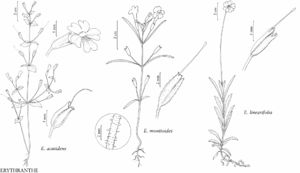Difference between revisions of "Erythranthe acutidens"
Phytoneuron 2012-39: 34. 2012.
FNA>Volume Importer |
imported>Volume Importer |
||
| (5 intermediate revisions by 2 users not shown) | |||
| Line 9: | Line 9: | ||
|special_status={{Treatment/ID/Special_status | |special_status={{Treatment/ID/Special_status | ||
|code=F | |code=F | ||
| − | |label= | + | |label=Illustrated |
}}{{Treatment/ID/Special_status | }}{{Treatment/ID/Special_status | ||
|code=E | |code=E | ||
| Line 17: | Line 17: | ||
|label=Conservation concern | |label=Conservation concern | ||
}} | }} | ||
| − | |basionyms={{Treatment/ID/ | + | |basionyms={{Treatment/ID/Basionym |
|name=Mimulus acutidens | |name=Mimulus acutidens | ||
|authority=Greene | |authority=Greene | ||
| + | |rank=species | ||
| + | |publication_title=Bull. Calif. Acad. Sci. | ||
| + | |publication_place=1: 117. 1885 | ||
}} | }} | ||
|synonyms={{Treatment/ID/Synonym | |synonyms={{Treatment/ID/Synonym | ||
|name=M. inconspicuus var. acutidens | |name=M. inconspicuus var. acutidens | ||
|authority=(Greene) A. Gray | |authority=(Greene) A. Gray | ||
| + | |rank=variety | ||
}} | }} | ||
|hierarchy=Phrymaceae;Erythranthe;Erythranthe acutidens | |hierarchy=Phrymaceae;Erythranthe;Erythranthe acutidens | ||
| Line 48: | Line 52: | ||
-->{{#Taxon: | -->{{#Taxon: | ||
name=Erythranthe acutidens | name=Erythranthe acutidens | ||
| − | |||
|authority=(Greene) G. L. Nesom | |authority=(Greene) G. L. Nesom | ||
|rank=species | |rank=species | ||
| Line 62: | Line 65: | ||
|publication title=Phytoneuron | |publication title=Phytoneuron | ||
|publication year=2012 | |publication year=2012 | ||
| − | |special status= | + | |special status=Illustrated;Endemic;Conservation concern |
| − | |source xml=https:// | + | |source xml=https://bitbucket.org/aafc-mbb/fna-data-curation/src/2e0870ddd59836b60bcf96646a41e87ea5a5943a/coarse_grained_fna_xml/V17/V17_1275.xml |
|genus=Erythranthe | |genus=Erythranthe | ||
|species=Erythranthe acutidens | |species=Erythranthe acutidens | ||
Latest revision as of 19:28, 5 November 2020
Annuals, fibrous-rooted. Stems erect to ascending-erect, simple or diffusely branched, 4-angled, 7–20 cm, glabrous. Leaves basal and cauline; petiole 0 mm; blade palmately 3–5 veined, ovate to broadly ovate, 10–20 × 7–11 mm, base rounded to truncate, margins serrate-denticulate, apex acute, surfaces glabrous. Flowers herkogamous, 2–20, from proximal to distal nodes. Fruiting pedicels divergent-arcuate, sometimes becoming deflexed, 10–23 mm, longer than subtending leaves, glabrous. Fruiting calyces campanulate, 7–9 mm, margins subtruncate, glabrous, lobes reduced, subequal. Corollas pale pink to rose purple, throat yellow or deep pink externally with 2 yellow spots below abaxial limb, bilaterally symmetric, weakly bilabiate; tube-throat cylindric-funnelform, 9–12 mm, exserted beyond calyx margin; limb expanded 9–12 mm. Styles glabrous. Anthers included, minutely villous-hirsute. Capsules included, (4–)5–10 mm.
Phenology: Flowering Apr–Jul.
Habitat: Grassy slopes, sandy terraces, marshy places, lakeshores, creek sides, seep edges, shaded canyon slopes, roadcuts and roadsides, woodlands of Pseudotsuga menziesii-Quercus chrysolepis, oak-gray pine, or interior live oak.
Elevation: 200–2000 m.
Discussion
Mimulus acutidens Greene is heterotypic with the South American M. acutidens Reiche, which is a later homonym.
Selected References
None.
